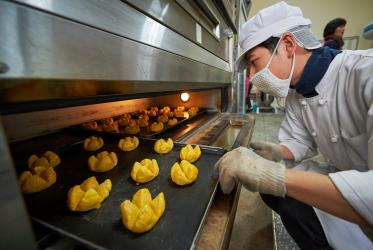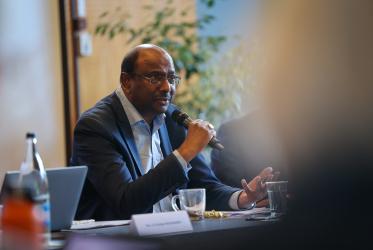How was “Serving a Wounded World” received by CREAS?
Prof. Shikiya: The document reached the knowledge of some members of CREAS through the social networks of the WCC. It should be remembered that the WCC has been one of the promoters of the creation of CREAS together with other specialized ministries of interchurch cooperation in Europe and North America 21 years ago.
How is this material relevant in the context where you work?
Prof. Shikiya: For the actions of capacity development, production of knowledge and mobilization of knowledge, of accompaniment to social community processes, technical and economic support to small projects and incidence in public policies. The document is very relevant because it motivates us to reflect deeply in biblical-theological terms about the meanings, intentions and strategic horizons of what CREAS does.
Its content is also a hopeful call to collaborate, ecumenically and interreligiously. This action must include other actors from civil society and multilateral cooperation. It is a context of deep inequalities with multiple wounds, where the outbreak of the pandemic has deep loss and damage.
The lives of millions of people in Latin America and the Caribbean have been substantially modified in an unprecedented way and it has shown us the degree of vulnerability that most or practically all human beings experience. The cultural mutation that occurred has been very dizzying in terms of relationships, circumstances, and behaviors. The degree of impact on the population has had social, psychological, economic, health, cultural, environmental, religious and spiritual dimensions.
What is the relevance of a global ecumenical document on these issues in the context of the pandemic in Latin America?
Prof. Shikiya: Throughout 2020, CREAS implemented strategies to face the health and economic emergency that added to the already existing crisis that Argentina and the region were going through. This intervention mainly sought to favorably impact lower-income sectors that depend on the informal economy, who saw their subsistence compromised, through the strengthening of food security projects, the provision of health supplies and resilience workshops that provided support to various populations in Argentina and Brazil.
These actions were carried out through agile cooperation mechanisms with initiatives of churches, ecumenical organizations and community networks. In the short term, it was possible to articulate with 11 community organizations and networks, reaching more than 75 neighborhoods in 10 Argentine provinces. In this way, support was provided to 400 families of indigenous peoples in northern Argentina through a project with women's groups providing animals for breeding and consumption, to address the food emergency and commercialize surpluses.
What is the main idea about using the document?
Prof. Shikiya: The document is very pertinent because it has the virtue of calling for group reflection and collective action. Therefore, CREAS has used it as an ecumenical study document through the method: see, judge, act and celebrate. This type of cross-sectional analysis has yielded a rereading and understanding of the document as a true cartography for roads with processes of de-construction, construction and re-construction based on dialogues, learning and conversions in the intercultural, ecumenical and interreligious encounter with others in concrete actions.
The usefulness of the document is to motivate and encourage ecumenical and interreligious cooperation to reinforce the commitment to the prophetic call to accompany, with hope, the reflections and actions that affect the promotion and strengthening of new forms of sustainable development with greater justice and peace, that protect life in its fullness and our common home.
In concrete terms, the document has also been an inspiration and a reference for the launch of a new project for the formation of young leaders from several churches in Latin America. The proposal called Ikumeni has the purpose of promoting good ecumenical and interreligious practices to contribute in a diaconal and transformative way to sustainable development, and the culture of peace and dignity with justice at the community level.








